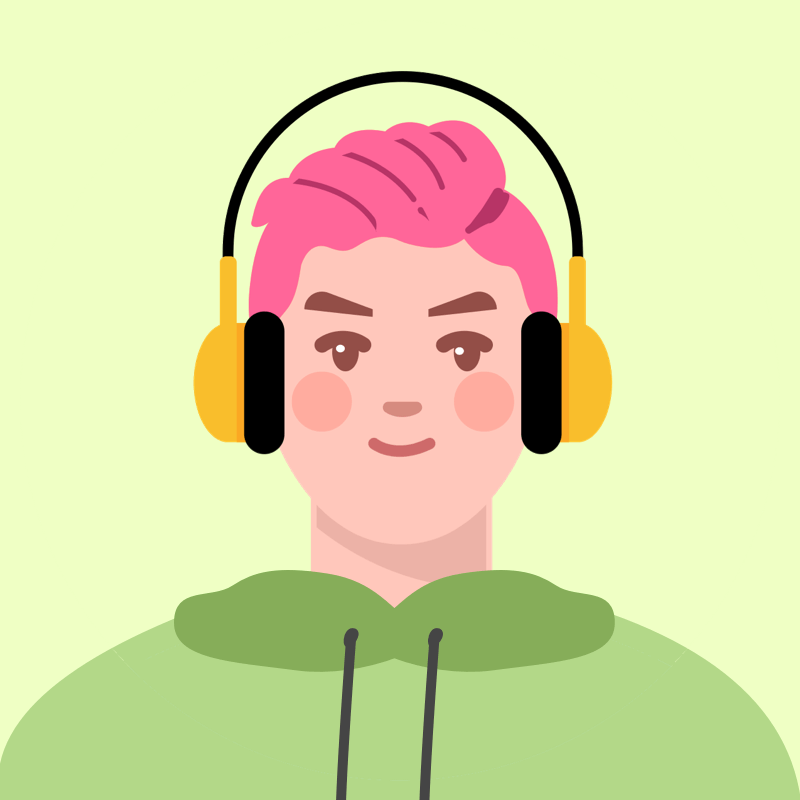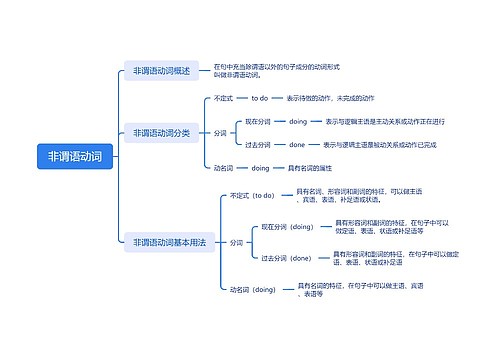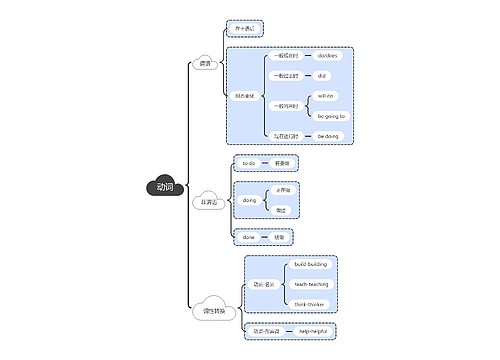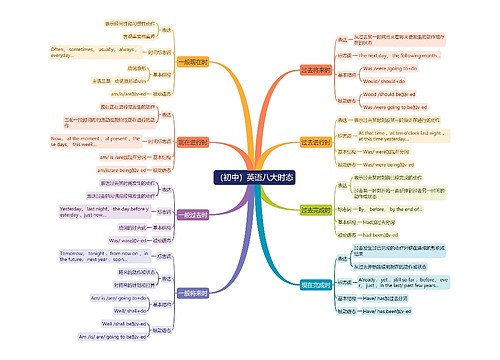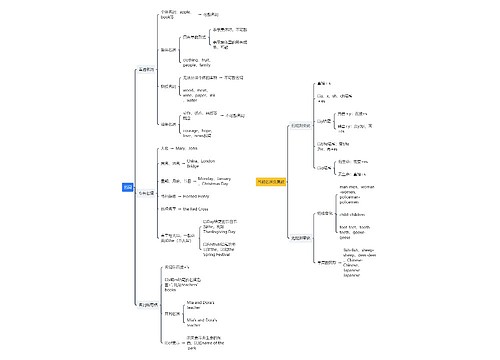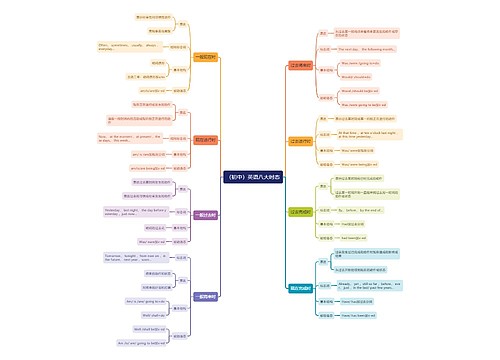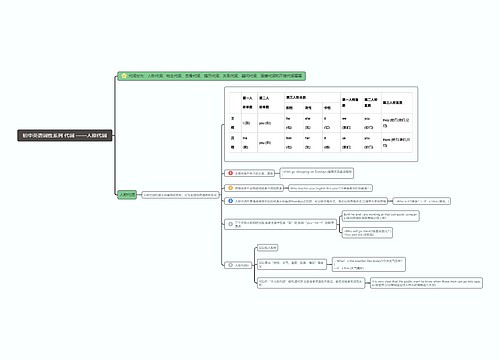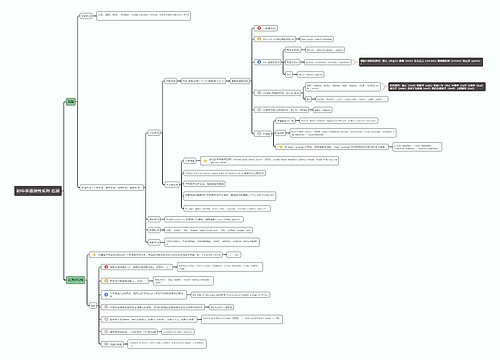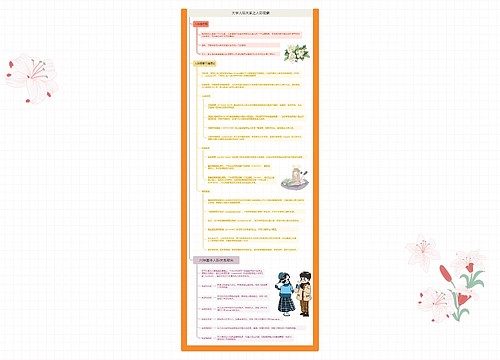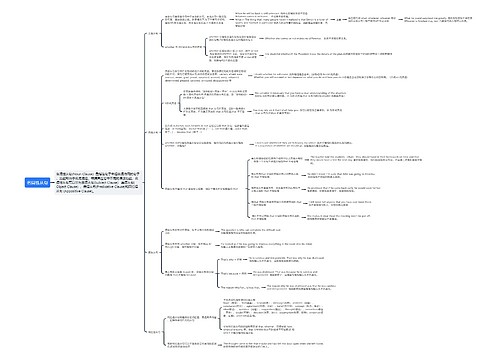
动词思维导图
U629092942
2023-07-29

动词
动词
树图思维导图提供《动词》在线思维导图免费制作,点击“编辑”按钮,可对《动词》进行在线思维导图编辑,本思维导图属于思维导图模板主题,文件编号是:b761c37980087df1a2feb3c13a7956c9
思维导图大纲
相关思维导图模版
动词思维导图模板大纲
实义动词
实义动词
及物动词
及物动词后必须跟动作的对象,即宾语,宾语直接跟在及物动词后。
☆ I enjoyed myself at the party. 聚会上我玩得很开心。
(“主+谓+宾”结构,enjoy是及物动词,后面可以直接跟宾语myself)
☆ The noise made me crazy. 噪声让我抓狂。
(“主+谓+宾+宾补”结构,make是及物动词,后面跟宾语me和宾语补足语crazy)
☆ My mum bought me a bicycle. 我妈妈给我买了一辆自行车。
(“主+谓+间宾+直宾”结构,buy是及物动词,后面跟双宾语,其中me是间接宾语,a bicycle是直接宾语)
不及物动词
可以直接作为谓语;
如果要加宾语,要在宾语前加介词
agree 同意
go 走
sleep 睡觉
die 死
look 看
fly 飞
sit 坐
come 来
listen 听
rain 下雨
rise 升起
belong 属于
hurry 仓促
work 工作
fall 落下
arrive 到达
happen 发生
stop 停止
fail 失败
☆ My watch doesn't work. 我的手表坏了。
☆ I agree. 我同意。
☆ I agree with you. 我同意你的观点。
不及物动词之后接同源宾语
少数不及物动词后面能跟一个特定的名词作宾语,这个名词和前面的动词在词根上是相同的或者在意义上是相近的,这样的宾语就叫作同源宾语。
breathe a deep breath 深呼吸
live a happy life 过着幸福的生活
dream a terrible dream 做噩梦
可两用的动词
有些动词既可作及物动词,又可作不及物动词
begin 开始
consider 考虑
read 读书
answer 回答
insist 坚持
prepare 准备
sing 唱歌
learn 学习
pay 付款
close 关
hurt 受伤
start 开始
☆ I have to think carefully before answering. 回答之前我得仔细思考。
☆ You have to answer the question. 你不得不回答这个问题。
☆ Birds sing. 鸟在叫。
☆ Let's sing a song. 我们唱首歌吧。
实义动词的五种形态
原形
当句子是一般现在时,主语是第一、第二人称或第三人称单数时,谓语动词要用原形
☆ I go to school on weekdays. 我平时去上学。
☆ You go to work on weekdays. 你平时去上班。
☆ They like reading together. 他们喜欢一起看书。
情态动词、助动词do以及动词不定式之后的动词用原形
☆ You can come with me. 你可以跟我一起去。
☆ Did he go to school today ? 他今天上学了吗?
☆ I tried to run as fast as I can. 我尽最大努力跑快一点。
祈使句中动词用原形
☆ Behave yourself. 规矩点。
☆ Help yourself to some beef. 请随便吃点牛肉。
第三人称单数
(does)
当句子是一般现在时,主语是第三人称单数时,谓语动词要用三单形式
☆ He goes to school everyday. 他每天去上学。
☆ The girl sings really nice. 那个女孩唱歌真好。
☆ The hat fits you. 这个帽子很适合你。
过去式
(did)
当句子是一般过去时,谓语动词要用过去式
☆ He went to school yesterday. 他昨天去上学了。
过去分词
(done)
当句子是完成时,谓语动词要用“have/has/had+过去分词”,助动词have的形态由主语和时态决定
☆ He has been to school today. 他今天去过学校了。
☆ I have watched the movie before. 我之前看过那部电影。
现在分词
(doing)
当句子是进行时,谓语动词要用“助动词be+现在分词”,助动词be的形态由主语和时态决定
☆ He is going to school now. 他现在正在去学校。
☆ I am watching a movie now. 我现在正在看一部电影。
系动词
状态系动词
表示主语存在的一种状态,只有be一个词,但是be动词有三个好朋友
be动词:am/is/are,随着主语的变化而变化
am:
心里只有“我”,只跟第一人称“I”连用
is:
跟“”三单人称“he,she,it”连用
are:
跟第二人称“you”及人称代词的复数“you,we,they”连用
be动词的缩写:am/is/are的首字母变成 '
I am = I'm
he is = he's
she is = she's
it is = it's
you are = you're
we are = we're
they are = they're
表像系动词
用来表示“看起来像”这一概念
常见的词:
look(看起来)、seem(似乎是)、appear(似乎、显得)等
持续系动词
用来表示主语继续保持一种状况或态度
常见的词:
keep(保持)、rest(保持)、remain(保持不变)、stay(保持某种状态)、stand(处于某种状态)
感官系动词
用来说明主语感觉的系动词
常见的词:
feel(感觉起来)、smell(闻起来)、sound(听起来)、taste(尝起来)
变化系动词
用来表示主语变成什么样的系动词
常见的词:
become(变得)、grow(渐渐变得)、turn(变得)、fall(进入某种状态)、get(变得)、go(趋于)、come(达到某种状态)、run(进展)
情态动词
can表示能力、许可
☆ He can run really fast. 他能跑得很快。
☆ You can (may) open the door now. 你现在可以开门了。
may表示允许或征求对方许可
☆ - May I come in ?
- Yes,please.
might表示可能性
☆ It might rain tonight. 今晚可能要下雨。
must表示必须、应该
☆ - Must I finish my homework before nine o'clock ? 我必须在9点前完成作业吗?
- No,you needn't. 没必要。
☆ You mustn't take photos in the museum. 你不能在博物馆里拍照。
must和have to 的区别:
⑴must侧重表示说话人的主观看法
You must do as I told you. 你必须按照我告诉你的那样做。
⑵have to则表示客观需要
You have to wear the coat because it's cold outside. 你需要穿件外套因为外面太冷了。
should表示建议或推测
☆ You should listen to your doctor. 你应该听医生的话。
☆ She should be in the office now. 她现在应该在办公室。
need常用于疑问句、否定句和条件句中
☆ Need I sing it again ? 我需要再唱一遍吗?
Yes,you must. / No,you needn't. 是的,你必须要。/不,你没必要。
shall用于征求对方的意见
☆ Shall I turn down the music ? 我可以把音乐声调低吗?
☆ Shall she wait outside ? 她需要等在外面吗?
will表示意志或决心
☆ The doctor told him to stop smoking,but he will not listen.
医生告诉过他戒烟,但是他不听。
would表示主观意志
☆ Would you like something to drink ? 你想喝点什么吗?
☆ I said I would do my best. 我说过我要尽最大努力。
助动词
be
(am,is,are,was,were,been)
“be+现在分词”构成进行时态
☆ The girl is dancing to the music.
那个女孩正随着音乐翩翩起舞。
☆ Mom was cooking when I came home.
我到家时妈妈正在做饭。
“be+过去分词”构成被动语态
☆ The window was broken by the naughty boy.
窗户被那个淘气的男孩打破了。
have
(has,had)
“have+过去分词”
构成完成时态
☆ She has already read the book.
她已经看过那本书了。
☆ We have met before. 我们以前见过。
与不定式构成谓语,表示“不得不”
☆ It's late,we have to leave right now.
已经晚了,我们现在得离开了。
do
(does,did)
“do not+动词原形”
构成否定式
☆ I don't like noodle.
我不喜欢吃面条。
“do+主语+动词原形”
构成一般疑问句
☆ Do you like our new teacher ?
你喜欢我们的新老师吗?
“do+动词原形”
用在祈使句或陈述句中,加强语气
☆ I did believe her at first.
我刚开始确实是相信她的。
☆ Do remember to drop us a line.
请一定记得给我们写信。
will,shall
“will(shall)+动词原形”
构成一般将来
一般shall用于第一人称,
will用于第二人称或第三人称,
口语中常用will代替shall
☆ I shall be back soon. 我很快就会回来。
☆ You will get your wish. 你会心想事成的。
☆ She will have a meeting this afternoon.
今天下午她要参加一个会议。
☆ You look just like your dad.
你长得像你的爸爸。
☆ You seem a bit nervous. Is everything alright.
你似乎有些紧张。一切都好吧?思维导图模板大纲
☆ The noise kept her awake.
噪声使她难以入睡。
☆ Please stay quiet.
请保持安静。思维导图模板大纲
☆ Lucy is a knockout.
露西是个绝代佳人。
☆ David is really a heartbreaker.
大卫真是个负心汉。
☆ I am a student.
我是学生。思维导图模板大纲
☆ Do you feel better ?
你感觉好点儿了吗?
☆ The food tastes good.
食物品尝起来很好。思维导图模板大纲
☆ I fall asleep very easily.
我很容易睡着。
☆ It's getting warm now.
天气现在渐渐变暖了。思维导图模板大纲
查看更多
相似思维导图模版
首页
我的文件
我的团队
个人中心
